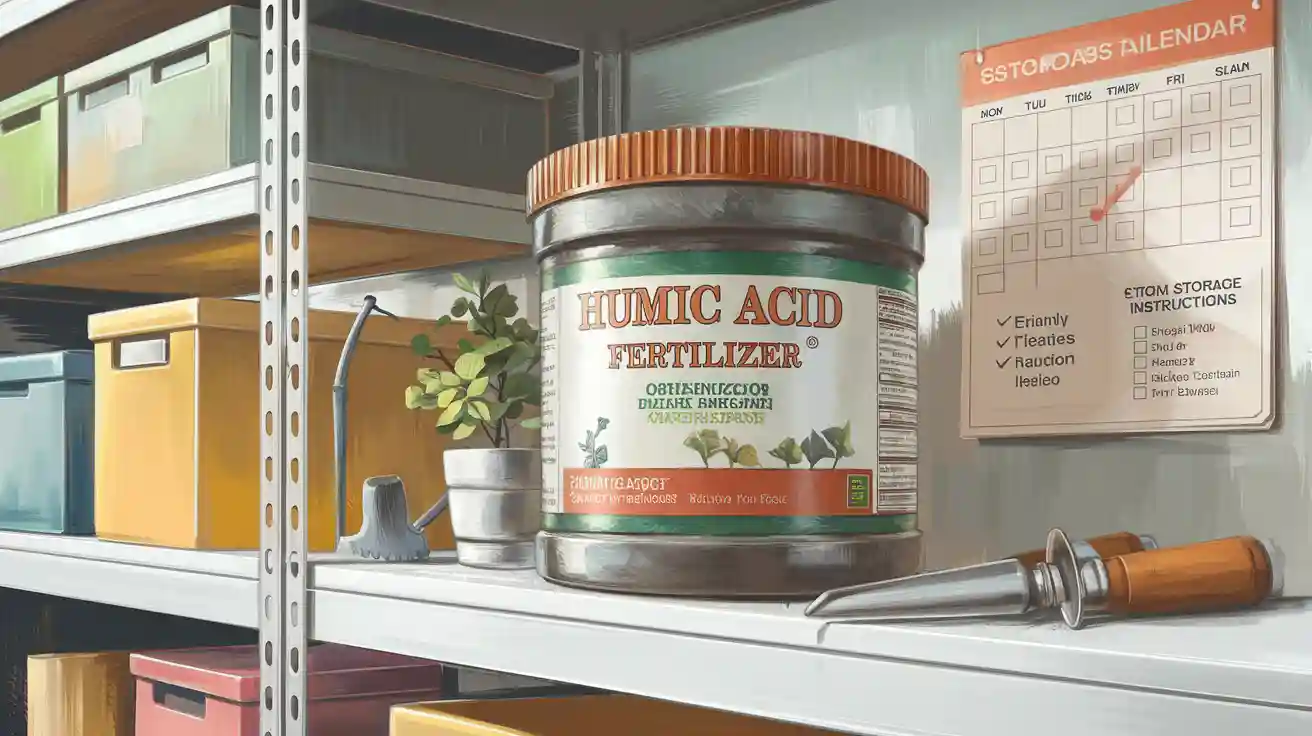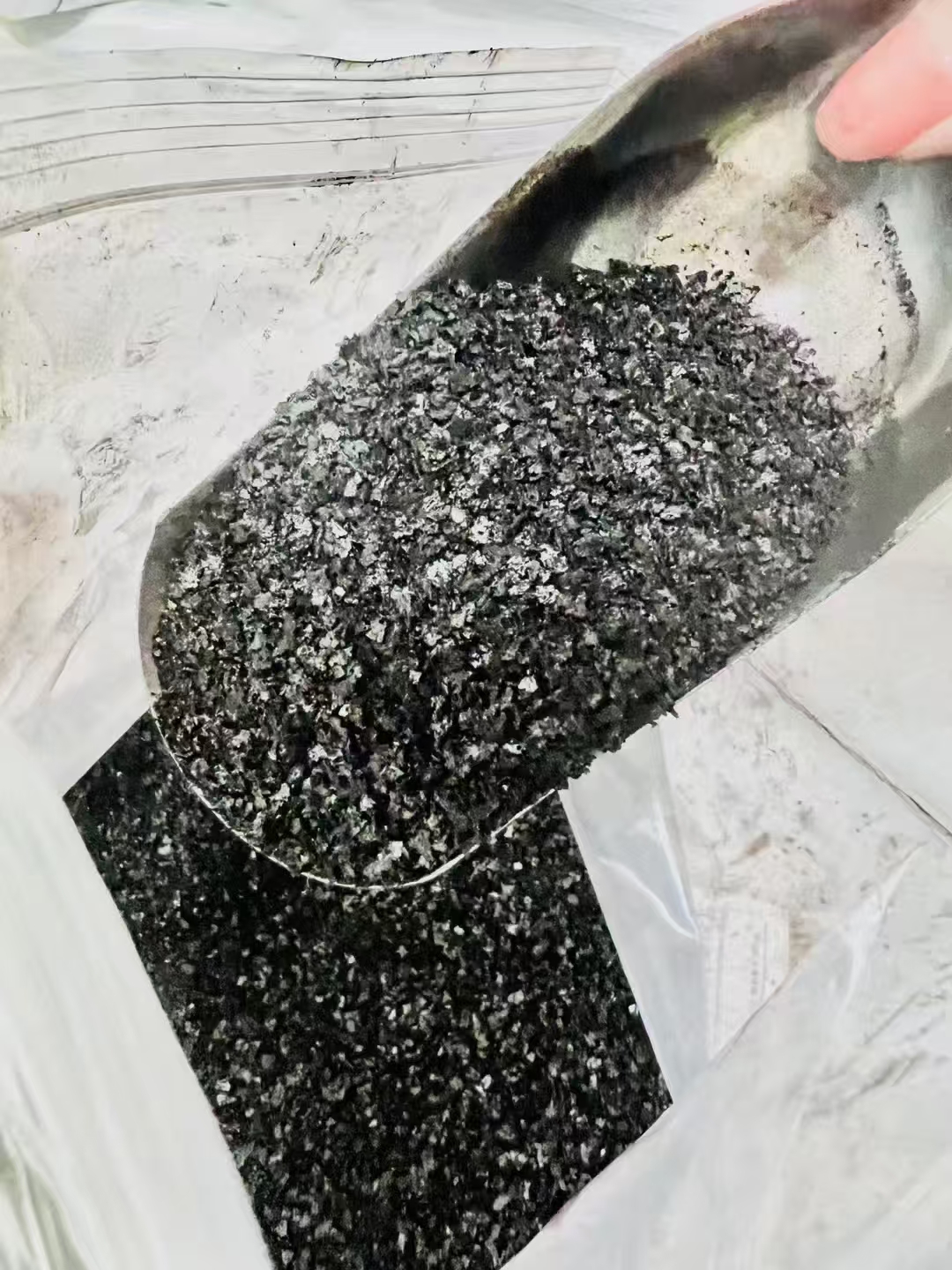Does humic acid fertilizer expire and how to store it?

You might ask if humic acid fertilizer can go bad. Most fertilizers last a long time if you store them right. Knowing how long your fertilizer works helps you save money. It also keeps your plants safe. Check expiration dates to get the best results in your garden.
Key Takeaways
Humic acid fertilizer can last one to three years. The type of fertilizer changes how long it lasts. Liquid fertilizers last one to two years. Granular types can last up to three years if stored well.
Keep fertilizer in a cool and dry place. Do not let sunlight or water touch it. This helps it work better and stops it from sticking together.
Use airtight containers to keep out air and water. This keeps the fertilizer fresh. It also stops nutrients from being lost.
Check your fertilizer often for any problems. Look for clumps, mold, or bad smells. Always check the expiration date before using it.
If the fertilizer is old or looks spoiled, do not use it. Throw it away safely to protect your garden and nature.
Humic Acid Fertilizer Shelf Life
How Long Does It Last?
You want your fertilizer to last a long time. How long it lasts depends on the kind you have. Liquid humic acid fertilizer can last one to two years if you store it right. Granular fertilizer can last about two to three years. Granular types are more stable than liquid ones. They are better for storing for a long time. If you keep fertilizer sealed and away from heat, it works best for your soil and plants.
Here is a table to help you compare shelf life:
Type of Fertilizer | Shelf Life (Unopened) | Shelf Life (Diluted) |
|---|---|---|
Most liquid fertilizers (concentrate) | 1–2 years | N/A |
Organic-rich formulas | N/A | 24–48 hours (after dilution) |
Granular humic acid fertilizer is good for long storage. You can use it for up to three years if you keep it dry and cool. Liquid types work best if you use them in two years. After you mix liquid fertilizer with water, use it in two days. This helps your soil get more nutrients and keeps your organic fertilizers working well.
What Affects Shelf Life?
Many things can change how long fertilizer lasts. Temperature is a big factor. If you store fertilizer where it is between 25°C and 60°C, it might lose some water. You can fix this by sealing it again. If it gets hotter than 70°C, the water loss cannot be fixed. At even higher heat, the fertilizer can break down and lose nutrients.
Temperature Range (°C) | Observation | Type of Loss |
|---|---|---|
25-60 | Reversible loss of water | Reversible |
Above 70 | Irreversible loss of water | Irreversible |
Up to 95 | Similar responses in aqueous solutions | N/A |
110-240 | Gradual decomposition producing CO2 and CO | N/A |
Moisture can also change how long fertilizer lasts. If water gets in, it can clump or spoil. Sunlight can break down organic materials and lower the nutrients in your soil. Always keep fertilizer in a cool, dry place for long storage.
You should also watch for contamination. If you open the container a lot or use dirty tools, you can add bacteria or mold. This can ruin your organic fertilizers and hurt your soil. Label your containers and keep them closed tight to protect the nutrients.
Tip: Store your fertilizer in airtight containers and keep them away from direct sunlight. This helps you get the most out of your organic fertilizers and supports healthy soil.
If you follow these steps, your humic acid fertilizer will stay fresh and work well for your garden or farm. Good storage helps you save money and keeps your soil full of nutrients.
Storing Humic Acid Fertilizer

Best Storage Conditions
You want your fertilizer to work well for a long time. The way you store it matters a lot. Always put your fertilizer in a cool and dry place. Do not let it sit in the sun or get too hot or cold. Keeping the temperature steady stops water from building up inside. This helps stop clumps and keeps it from going bad. Good airflow keeps the air dry and protects your organic fertilizers from getting wet.
Here are some easy tips for storing fertilizer:
Keep fertilizer in a cool, dry spot.
Do not put it in the sun.
Stay away from places that are very hot or cold.
Make sure air can move around to keep things dry.
Tip: Storing fertilizer the right way keeps its nutrients strong and helps your plants grow better.
Airtight Containers
Airtight containers are important for keeping fertilizer safe. If you use open containers, air and water can get in. This can change your fertilizer and make it less useful. Airtight containers stop clumps and bad chemical changes. They also keep bugs out and help your fertilizer last longer.
Key Point | Description |
|---|---|
Exposure Risks | Open containers let in water, air, and germs. This can change humic acid and make it not work as well. |
Storage Importance | Using airtight containers stops clumps and bad chemical changes. This keeps the fertilizer working right. |
Storage Conditions | Keep humic acid in a cool, dry place and use airtight containers. This helps your soil and crops stay healthy. |
Pick containers made of strong plastic or glass with tight lids. Write the type of fertilizer and the date on each container. This helps you know how fresh it is and keeps you from mixing up different organic fertilizers.
Avoiding Sunlight and Moisture
Sunlight and water can ruin your fertilizer fast. If you leave it in the sun, the nutrients break down and it does not work as well. Sun heat can also dry it out and make it hard. If you use humic acid when the sun is strong, it might dry up before the soil can use it. For best results, use fertilizer in the morning or evening when the sun is not strong.
Water is also a big problem. It can make clumps or start bad chemical changes. This makes your organic fertilizers less helpful and can even hurt your soil. Always close containers tight and keep them off the ground so water cannot get in.
Use packaging that keeps out water and bugs.
Store fertilizer in a dry place, away from water.
Check containers often for leaks or wet spots.
Note: Good packaging and storage help your fertilizer last longer and keep your soil healthy.
If you follow these steps, your fertilizer will not get ruined. Your organic fertilizers will keep working well. This helps your soil get the nutrients it needs for strong, healthy plants.
Fertilizer Storage Mistakes
Common Errors
Storing fertilizer may seem easy, but many people make mistakes. These mistakes can hurt your soil and plants. If you do not store fertilizer right, you lose nutrients. You also waste your organic fertilizers. Experts say there are four main mistakes gardeners make. The table below shows these mistakes and what happens:
Storage Mistake | Implication |
|---|---|
Improper Storage Conditions | |
Exposure to Moisture | Fertilizer gets clumpy and hard to use. |
Lack of Airtight Containers | Fertilizer loses strength and does not last as long. |
Inadequate Temperature | Important parts break down and work less. |
If you keep organic fertilizers in a wet place, they can clump up. This ruins the nutrients. If your containers do not close tight, air and water get inside. This makes fertilizer weaker and can harm your soil. If you store fertilizer in places that are too hot or cold, it breaks down. Your plants get fewer nutrients.
How to Prevent Issues
You can stop these problems by following expert tips. Here are six steps to keep your organic fertilizers safe:
Put fertilizer in a cool, dry spot and use airtight containers.
Keep the temperature between 40°F and 90°F to protect nutrients.
Store fertilizer away from other chemicals to avoid bad reactions.
Label each container with the type, when you bought it, and when it expires.
Use older fertilizer first so you do not waste any.
Keep fertilizer where kids and pets cannot reach it.
Check your fertilizer often and make sure labels are clear. These steps help keep nutrients strong and your soil healthy. You will see better results in your garden if you store fertilizer the right way. Airtight containers and dry places stop clumping and keep fertilizer clean. Good habits help humic acid last longer and give your soil the best nutrients.
Tip: Look at your fertilizer containers every month for leaks or wet spots. This easy step keeps your organic fertilizers working and helps your soil stay healthy.
Signs of Expiry
How to Check Fertilizer Quality
You want your fertilizer to help your soil and plants grow strong. Checking the quality of humic acid fertilizer is easy if you know what to look for. Start by reading the expiration date on the package. Most organic fertilizers have a two year expiration date. If you see a date that has passed, the fertilizer may not work as well.
Look at the color and texture. Good fertilizer should look dark and rich. If you see clumps, mold, or a strange smell, the fertilizer may have gone bad. Shake liquid fertilizer before you use it. If you notice layers or separation, the nutrients might not mix well anymore. Granular fertilizer should not have hard lumps or dust. These signs show that moisture has changed the product.
Test a small amount in your soil. If you do not see healthy growth or if your plants look weak, the nutrients may not be strong enough. You can also check if the fertilizer dissolves in water. If it does not mix well, it may have passed its two year expiration date.
Tip: Always store organic fertilizers in a cool, dry place to keep nutrients fresh and protect your soil.
What to Do If It’s Bad
If you find that your fertilizer has expired or lost quality, you have several safe options. Do not use fertilizer that smells bad or looks moldy. This can harm your soil and plants. You can donate fertilizer if it is still usable and safe for organic gardening. Many community gardens accept extra supplies.
If the fertilizer is truly expired, follow these steps for safe disposal:
Contact professional disposal services for proper handling.
Read the packaging instructions for disposal tips.
Never throw old fertilizer in the trash or pour it down the drain. This can hurt the environment and your local soil. Always choose safe methods to protect your garden and keep organic nutrients out of landfills.
Note: Proper disposal keeps your soil healthy and helps you follow local rules for organic fertilizers.
You can keep your organic fertilizer working well by storing it the right way. Good storage helps your organic soil stay healthy and full of nutrients. When you protect your organic fertilizer, you help your soil hold water and support strong plants. You also save money because you do not need extra products.
Store smart: Keep your organic fertilizer dry and sealed.
Use airtight containers to protect your organic soil and keep it fresh.
Check your soil and organic fertilizer often for signs of spoilage.
FAQ
How do you know if humic acid fertilizer is still good?
Check the color and texture. Good fertilizer looks dark and smooth. If you see clumps, mold, or a bad smell, it may not work well. Always read the expiration date before using it.
Can you store fertilizer outside?
You should not store fertilizer outside. Rain, sunlight, and temperature changes can damage it. Keep it in a cool, dry place indoors to protect the nutrients and keep your plants healthy.
What happens if you use expired humic acid fertilizer?
Expired fertilizer may not help your plants grow. It can lose nutrients and sometimes harm your soil. Always check the package before using it to make sure it is safe and effective.
Is it safe to mix humic acid fertilizer with other garden products?
You can mix humic acid fertilizer with some garden products. Always read the labels first. Mixing with chemicals can cause problems. Test a small amount before using it on all your plants.
See Also
Top Fertilizers That Pair Effectively With Humic Acid
Comparing Humic Acid Fertilizer And Chemical Options For Sustainability
Tips For Recognizing Quality Humic Acid Fertilizers By 2025
Exploring The Growth Potential Of Humic Acid Fertilizers In 2025
Comparing Humic Acid Fertilizers And Fish Protein Alternatives
